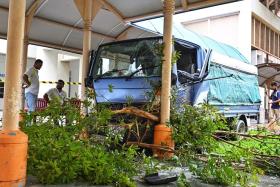Mother of 2 is first woman to don SOC red beret
Assistant Superintendent of Police (ASP) Candy Ko, 32, overcame multiple challenges, such as building up her fitness after piling on 27kg during her second pregnancy and raising a child who had kidney cancer, to become the first and only woman to join the Police Tactical Unit (PTU).
The PTU responds to public order and public security incidents, such as riots and terrorist threats, and is under the Special Operations Command (SOC). The SOC has been described as the Singapore police’s elite force.
Officers have to complete a rigorous three-month-long Police Tactical Course, which equips them with the skills and capabilities to deal with public order and public security incidents, to join the PTU.
ASP Ko is the first woman to complete the course and was the parade commander during the graduation ceremony in April.
She said: “I was happy and proud of myself. It was quite tough for me as the course was tiring and intense.”
ASP Ko also has the distinction of being the first female officer to be given the SOC red beret, a symbol of “bravery and sacrifice”.
In her career of 10 years and counting with the Singapore Police Force, she has served in different postings, such as an investigation officer and a team leader at the Emergency Response Team.
But for the past five years – which spanned her two pregnancies – she was doing administrative work related to training.
During her second pregnancy, her weight ballooned to more than 80kg. After she gave birth, she found it hard to even run 1km.
She was determined to regain her fitness and started running almost every day. After six months of training, she managed to shed most of her pregnancy weight gain and achieved a gold in the individual physical proficiency test.
She also wanted to go back to an operational role and she aspired to join the SOC, though filled with self-doubt, unsure if she could complete the Police Tactical Course, which has been described as being physically and mentally gruelling.
Her bosses, colleagues and husband encouraged her to give it a shot.
One particularly difficult segment of the course was when she had to complete a 16km-long march armed with gear, such as firearms, that weighed up to 20kg.
But she told herself to press on, despite her exhaustion.
When asked what was it like to be the only woman training with a troop of men, she said: “Of course, I was not the fittest. At times, I was the slowest, but I kept running and I would try to overtake the man running in front of me.
“The men were all very friendly and some would check on me.”
Beyond physical fitness, ASP Ko said she also contributed to her troop with her experience and intellect in handling different scenarios.
As a first-time mother, ASP Ko also had to deal with her daughter’s illness.
When the girl was four months old, doctors found a cancerous tumour inside one of her kidneys. Before she celebrated her first birthday, the girl had both kidneys removed and had undergone chemotherapy. The girl, now four, spent seven or eight months in hospital with her parents always by her side.
ASP Ko said: “Of course, I was sad. At first, I wondered why is this happening and did I do something wrong?”
But she and her husband, Mr Benjamin Alexander Chua, did not dwell on their sadness and were kept busy by their daughter’s treatment and dialysis.
Dialysis was a nightly affair for their daughter for about three years until Mr Chua, a 34-year-old public servant, donated one of his kidneys to her in October 2023.
He said of his decision to donate his kidney: “My wife had two caesarean deliveries, so I didn’t think it’s fair for her to go under the knife for the third time.”
The couple said their daughter, who used to be lethargic before the transplant, is now energetic and chatty. The couple also have a two-year-old son.
Mr Chua said of his wife’s achievement: “I’m very proud of my wife as it can be very difficult for females in a male-dominated environment, and she has to earn the respect of men much younger than her. She is a very resilient and down-to-earth woman.”
ASP Ko said she could not have completed the course without her husband’s support, for she had to stay in camp during training on weekdays. A domestic helper and her mother-in-law also helped her husband look after their two young children.
ASP Ko has this message for other women who are thinking of joining the police or even the SOC: “Don’t be afraid. Take it one step at a time and you will get there eventually.
“Follow your heart.”
Get The New Paper on your phone with the free TNP app. Download from the Apple App Store or Google Play Store now


